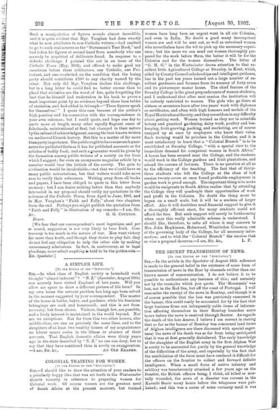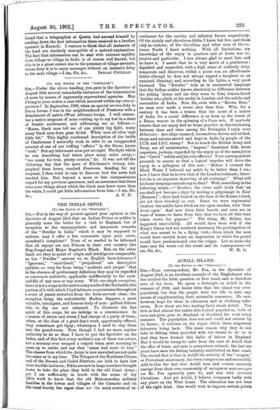THE SECRET TRANSMISSION OF NEWS.
[TO TUE EDITOR OF TUE "SPECTATOR.••]
SIR,—In the article in the Spectator of August 16th reference is made to the general belief in the existence of some form of transmission of news in the East by channels swifter than our known means of communication. I do not believe it to be possible to authenticate any instance of this; and certainly not by the examples which you quote. The 'Roumania' was lost, not in the Red Sea, but off the coast of Portugal. I well remember the receipt of the news in Bombay, and though it is of course possible that the loss was previously rumoured in the bazaar, this could easily be accounted for by the fact that large business firms not infrequently cable items of informa- tion affecting themselves to their Bombay branches some hours before the news is received through Reuter. As regards the death of the late Ameer, I believe I am correct in stating that so far as the bazaar of Bombay was concerned (and items of Afghan intelligence are there discussed with special eager- ness) the news of his death was so far from being anticipated that it was at first generally disbelieved. The early knowledge of the slaughter of the English army in the first Afghan War is surely to be accounted for, partly by the general knowledge of the difficulties of the army, and especially by the fact that the annihilation of the force must have sundered it difficult for the officers on the frontier to collect and forward definite intelligence. When a small force of native infantry and artillery was treacherously attacked a few years ago on the frontier, the British officers being, I think, all killed or mor- tally wounded, the news of a disaster was current, in the Karachi Bazar many hours before the telegrams were pub- lished; and this was a cause of some curiosity until it was
found that a telegraphist at Quetta had amused himself by sending down the first information there received to a brother operator in Karachi. I venture to think that all instances of the kind are similarly susceptible of a natural explanation. The fact that information can be sent with extreme rapidity from village to village in India is of course well known, but this is to a great extent due to the presence of village servants, whose duty it is to carry messages without an instant's delay to the next village.—I am, Sir, &o., INDIAN CIVILIAN.







































 Previous page
Previous page